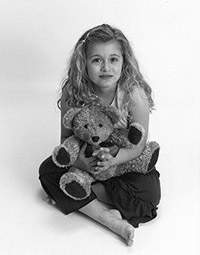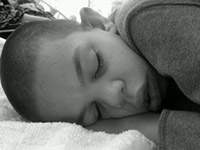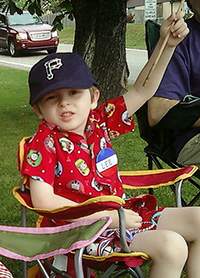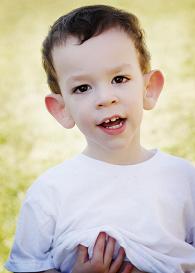Autism Related Disorders
Please contact us at 412-781-4116 or
1-800-827-9385 to get help for any of these conditions:
Asperger Syndrome
 Asperger Syndrome (AS) is an autism spectrum disorder that is characterized by significant difficulties in social interaction, along with restricted and repetitive patterns of behavior and interests. The primary distinction that clinicians make between AS and autism is the age of language acquisition. Children with AS develop spoken language before three and a half years of age, while children with classic autism have later language acquisition, or may never speak.
Asperger Syndrome (AS) is an autism spectrum disorder that is characterized by significant difficulties in social interaction, along with restricted and repetitive patterns of behavior and interests. The primary distinction that clinicians make between AS and autism is the age of language acquisition. Children with AS develop spoken language before three and a half years of age, while children with classic autism have later language acquisition, or may never speak.
Many individuals with AS are initially overlooked due to their relative ability to cope with the world around them; parents may attribute their AS symptoms to eccentricities or a childhood phase. It is often only when children with AS reach school age and begin to experience difficulties in social communication that parents and professionals suspect that something is wrong. AS may not be diagnosed until adulthood, when the individual on the spectrum encounters difficulties with employment or social interaction.
The extent of the overlap between AS and high-functioning autism (HFA) is unclear. One of the proposed changes in the upcoming revision of the Diagnostic and Statistical Manual of Mental Disorders (DSM-5) would eliminate Asperger Syndrome as a separate diagnosis, and fold it under Autistic Disorder, which would be rated on a severity scale.
Contact us if you suspect that your child, yourself, or someone you know has Asperger Syndrome. We will connect you with professionals who can help.
PDD-NOS
Pervasive Developmental Disorder Not Otherwise Specified (PDD-NOS) is an autism spectrum disorder that is often referred to as atypical autism. A diagnosis of PDD-NOS indicates that the individual has many of the signs of autism while not meeting the full criteria for autism or Asperger Syndrome (AS). The symptoms are pronounced enough to interfere with the person’s ability to function normally.
People with PDD-NOS may be high-functioning or low-functioning, depending on the severity of the condition. Just as the autism spectrum covers a wide range of abilities, so do cases of PDD-NOS.
As with AS, the extent of the overlap between PDD-NOS and autism is unclear. One of the proposed changes in the upcoming revision of the Diagnostic and Statistical Manual of Mental Disorders (DSM-5) would eliminate PDD-NOS as a separate diagnosis, and fold it under Autistic Disorder, which would be rated on a severity scale.
Contact us if you suspect that your child has PDD-NOS or another autism spectrum disorder. We will connect you with professionals who can help.
Sensory Issues
 Children learn from their experience. When sensory information is faulty, as is often the case with autism, experiences of the world can be confusing. Many people with autism are highly attuned to certain sounds, textures, tastes, and smells. Additionally, senses of balance and pressure can be dysregulated. Things the rest of us do not notice can be very painful or disruptive to a person with autism.
Children learn from their experience. When sensory information is faulty, as is often the case with autism, experiences of the world can be confusing. Many people with autism are highly attuned to certain sounds, textures, tastes, and smells. Additionally, senses of balance and pressure can be dysregulated. Things the rest of us do not notice can be very painful or disruptive to a person with autism.
Many sensory issues, combined with communication deficits, can lead to challenging behaviors as the person attempts to get away from or block confusing or unpleasant sensory experiences.
Be aware that your person with autism may not be aware of, or not able tell you about:
- Medical problems such as ear infections or appendicitis.
- Dental problems.
- Sprains or even broken bones.
- Burning themselves with hot water, while cooking, or by touching other hot items.
- Frostbite.
Contact us so we can connect you with local professionals to help you with sensory disorders and autism.
Eating Challenges
Children with autism often have feeding issues. Whether due to food intolerances, or because of sensory differences (including issues with texture, taste, temperature, pressure, or chewing noises), getting proper nutrition can be a challenge. Additionally, since people with autism often have poor oral motor skills, they may be susceptible to choking on certain foods.
Contact us if you need help with nutritional issues so we can connect you with professionals who can help.
Mental Health Issues
 People with autism often suffer from anxiety, depression, obsessive-compulsive disorder, and other mental health issues. Some people with autism have a biological predisposition to these disorders; others may develop these conditions out of their constant struggle to cope with the world around them. People on the autism spectrum may be susceptible to developing mental health issues under certain circumstances, such as:
People with autism often suffer from anxiety, depression, obsessive-compulsive disorder, and other mental health issues. Some people with autism have a biological predisposition to these disorders; others may develop these conditions out of their constant struggle to cope with the world around them. People on the autism spectrum may be susceptible to developing mental health issues under certain circumstances, such as:
- Feeling lonely.
- Suffering from bullying or abuse.
- Becoming concerned that they are different from other people.
- Developing a growing awareness of their disability.
- Finding it difficult to form relationships or take part in social activities.
- Grieving the loss of a loved one.
- Experiencing feelings of sexual frustration.
- Having a string of perceived failures.
If you perceive that the person with autism is a danger to themselves or others, call 911 for immediate assistance.
Contact us if you have mental health concerns for the person with autism in your care, or for yourself. We will connect you with professionals who can help.
Attention Deficit Hyperactivity Disorder
People on the autism spectrum often suffer from ADHD. ADHD falls into three different categories:
ADHD—Primarily Inattentive Type:
- Fails to give close attention to details or makes careless mistakes.
- Has difficulty sustaining attention.
- Does not appear to listen.
- Struggles to follow through on instructions.
- Has difficulty with organization.
- Avoids or dislikes tasks requiring sustained mental effort.
- Is easily distracted.
- Is forgetful in daily activities.
ADHD—Primarily Hyperactive/Impulsive Type:
- Fidgets with hands or feet or squirms in chair.
- Has difficulty remaining seated.
- Runs around or climbs excessively.
- Has difficulty engaging in activities quietly.
- Acts as if driven by a motor.
- Talks excessively.
- Blurts out answers before questions have been completed.
- Has difficulty waiting or taking turns.
- Interrupts or intrudes upon others.
ADHD—Combined Type:
- Meets both inattentive and hyperactive/impulsive criteria.
For more information, visit Children and Adults with Attention Deficit/Hyperactivity Disorder (CHADD).
Contact us so we can connect you with local professionals who are experienced with autism and ADHD.
Motor and Vocal Tics
 There is much research that has been conducted on the incidence of autism and tics (repetitive, nonfunctional movements or sounds that cannot always be controlled). Researchers have found that there is a significant overlap between autism and tics or Tourette syndrome. When a person has tics without autism, the approach is to ignore the tics so as not to send a message to the brain “No Ticcing!” When the brain is alerted in this way, it only recycles the thought and produces more tics.
There is much research that has been conducted on the incidence of autism and tics (repetitive, nonfunctional movements or sounds that cannot always be controlled). Researchers have found that there is a significant overlap between autism and tics or Tourette syndrome. When a person has tics without autism, the approach is to ignore the tics so as not to send a message to the brain “No Ticcing!” When the brain is alerted in this way, it only recycles the thought and produces more tics.
One person with Tourette Syndrome has described trying to control tics as “trying not to hiccup.”
If a person with autism has tics, behavior plans aimed at stopping them (no poking! no flapping! no puffing!) often make matters worse. If the tics are just annoying but not harmful, ignoring is the best policy. You might also give the person a good place and time to release these brain-based urges. Sometimes tics can cause pain or injury. In these cases, supplements or medications can be of help. Talk to your neurologist if you suspect some behaviors may be tics.
Contact us if tics are a problem. We will connect you with doctors who can help with tics and autism.
Intellectual Disability
Many children with autism have some degree of intellectual impairment. When tested, some areas of ability may be normal or even above average, while others may be weak. For example, a person with autism may do well on test sections that measure visual skills but earn low scores on language assessments.
It is especially difficult to test the cognitive ability of people on the autism spectrum. Perceptual and processing speed may be delayed, making the person appear less intelligent than they actually are. Failure to correct for the perceptual differences of people on the autism spectrum may provide inaccurately low measurements of intelligence.
Contact us if you need help finding professionals who specialize in IQ testing for people with ASD.
Seizures or Epilepsy
Seizures, caused by abnormal electrical activity in the brain, can produce a temporary loss of consciousness (a “blackout”), body convulsions, unusual movements, or staring spells. One in four people with autism develops seizures, often starting either in early childhood or adolescence. While anyone can have a seizure, some people with autism have lower thresholds than others and can be more easily triggered.
A history of head injury is often associated with epilepsy. Some triggers for epilepsy can be: lack of sleep, a painful injury, strobe lights, or fever. An EEG test (electrodes applied to the scalp) can help confirm a diagnosis. Sometimes video monitoring combined with the EEG (done in an overnight hospital stay) helps with diagnosis. In most cases, seizures can be controlled with medication. Contact the Epilepsy Foundation of Western/Central Pennsylvania for more information.
Contact us if you have seizure concerns so that we can connect you with doctors who can help.
Fragile X
 Fragile X is a gene mutation, named for the pinched and fragile appearance of one part of the X chromosome. Although not all children with Fragile X Syndrome have autism, Fragile X Syndrome can cause a child to have autism or autistic-like characteristics. Between 2% and 6% of autism is caused by a Fragile X gene mutation. You may want to request that your doctor test for Fragile X Syndrome.
Fragile X is a gene mutation, named for the pinched and fragile appearance of one part of the X chromosome. Although not all children with Fragile X Syndrome have autism, Fragile X Syndrome can cause a child to have autism or autistic-like characteristics. Between 2% and 6% of autism is caused by a Fragile X gene mutation. You may want to request that your doctor test for Fragile X Syndrome.
To learn more about Fragile X and autism, please visit the National Fragile X Foundation, or call them at
1-800-688-8765.
Contact us if you suspect Fragile X so we can connect you with local professionals who can help.
Tuberous Sclerosis
Tuberous Sclerosis (TS) is a rare genetic disorder that causes benign tumors to grow in the brain as well as in other organs. Most cases are due to new mutations, so there usually is no known family history of the disease.
The person with TS may have white patches on the skin with a confetti appearance, red patches on the face consisting of many blood vessels, or raised “orange peel” patches of skin, most often found on the back. Due to tubers (non-cancerous tumors) growing in the brain, TS can cause intellectual disability, autism, and seizure disorders. Tubers can also grow in the kidneys and heart.
A person may have TS with little or no symptoms, through many have disabling and life-threatening complications.
To learn more, contact the Tuberous Sclerosis Alliance, or call them at
1-800-225-6872.
Contact us if you suspect Tuberous Sclerosis so we can connect you with professionals who can help.
Providing Autism Support in Pennsylvania
412-781-4116 800-827-9385 support@AutismOfPA.org